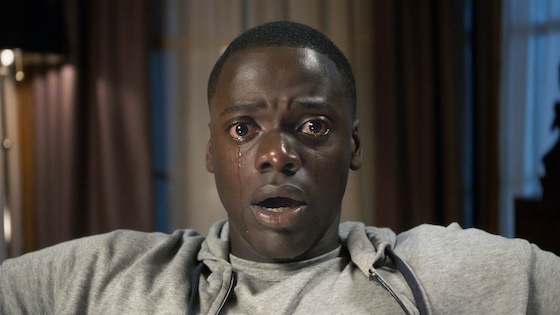GET OUT of my Country

Daniel Kaluuya as Chris in Jordan Peele's GET OUT.

Racism is so deeply embedded in this country not because of the racist right-wing radicals who practice it openly, it exists because of the silence and hurt feelings of liberal America.
In 2016, writer John Metta published a sobering op-ed, originally given as a sermon, about the insidious nature of systemic racism titled I, Racist. In it, he examines the difficulty, the fruitlessness, of having dialogues about racism with white people. He wasn’t calling whites evil. On the contrary, Metta’s piece examines the challenge of trying to get even the most progressive of whites to acknowledge the deeply embedded systemic privilege of which they are the primary beneficiaries.
In the era of Trumpism, the likelihood of liberal whites reconciling their own role in racism is even dimmer. Headlines pepper the news cycle weekly, like the Olathe, KS, man who killed an Indian American and injured another, shouting, “Get out of my country.”
EDIT: Since starting this piece, a Sikh was shot in Kent, WA, by another white gunman.
We can’t examine where we are as a society if one half thinks the other half is the problem while the other half is idiotically preoccupied not so much with figuring out what to do with absolute power now that they have it, but perversely obsessed with figuratively and literally spitting in the face of immigrants, minorities, and anyone else that dares to challenge the privilege that both halves of white America enjoy.
Srinivas Kuchibhotla wasn’t challenging anyone. He was having a beer with his coworker from Garmin, a GPS device manufacturer, at a bar in suburban Olathe, KS, when Adam Purinton shot and killed him. As a Dallas resident, a United States citizen who immigrated from India and grew up in North Dakota, I’m no stranger to racial confrontation. But this comes after an authoritarian President, who pandered openly to bigotry on the campaign trail, passed Executive Order 13769 which was used to deny re-entry to immigrant visa holders, lawful Permanent Residents, and even U.S. Citizens such as my fellow Indian American, NASA/JPL employee Sidd Bikkanavar, on no other basis than being from predominately Muslim countries.
The administration, having the lowest recorded approval ratings for an incoming U.S. President, lacked the courage of its convictions to admit the true purpose of what many have called the Muslim Ban (including Trump himself). Instead, they hemmed and hawed until the Solicitors General of Washington and Minnesota appealed to the Ninth U.S. Circuit Court.
That’s what I want to say, but really, I can’t. I can’t say that because I’ve spent my life not talking about race to White people. In a big way, it’s my fault. Racism exists because I, as a Black person, don’t challenge you to look at it.
Racism exists because I, not you, am silent.
But I’m caught in the perfect Catch 22, because when I start pointing out racism, I become the Angry Black Person, and the discussion shuts down again. So I’m stuck.
Enter comedian and social commentator Jordan Peele. Any time we have, as a society, found it difficult to break through and confront one another with inconvenient truths, comedians and satirists have taken pen to paper to show us how its done.
Peele’s debut film, GET OUT, opened two weeks ago, just as White House advisor Stephen Bannon was being decimated in the media for his blithely ignorant masturbation to Jean Raspail’s The Camp of the Saints, which Kirkus Reviews described upon its publication in 1975, “as a major event, and it probably is, in much the same sense that Mein Kampf was a major event.”
In GET OUT, Chris Washington (Daniel Kaluuya) is invited to his girlfriend’s family estate, a liberal enclave. The Armitages, Missy and Dean’s (Catherine Keener and Bradley Whitford cast in roles fitted neatly to each’s trope-ridden C.V.) facile embrace of multiculturalism immediately recalls the perverse, paternalistic slavery apologetics of Rudyard Kipling and Henry Morris.
GET OUT plays like a stylized, exaggerated tale in the vein of occult horror, yet its root is the horror that people of color live in reality: Viewed as objects of hatred or perverse obsession, rather than human beings with agency. Here, Peele explores the concept of loss of agency literally, with callbacks to pre-Trump, coded allegory in INVASION OF THE BODY SNATCHERS, ROBOCOP and the upcoming, tone-deaf remake of GHOST IN THE SHELL in which the reverse happens: an Asian is trapped in a white android for the sake of Hollywood grosses.
Kaluuya’s perfection of dissociation in the face of clear and present danger plays as well here as it did in his breakout television appearance in BLACK MIRROR (“Fifteen Million Merits”). As minorities, we’re mostly inured by the larger shared illusion of freedom within the surveillance state. But when our individual liberties are so directly attacked, and worse, by the current Presidential administration, it serves as a reminder that in the eyes of white America, we are not human. We are a statistic, a talking point, for both white liberals and conservatives to volley back and forth as they fight over privileges we don’t even imagine are within reach.